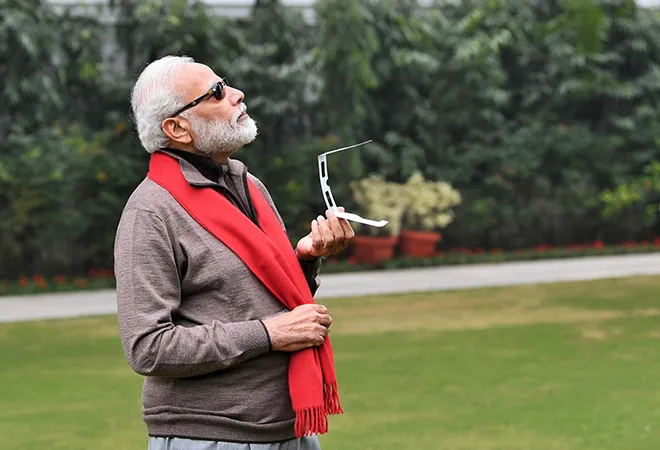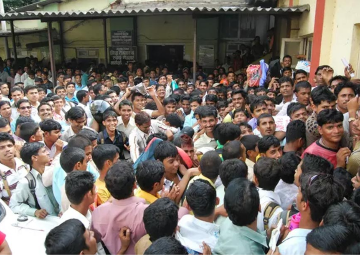
It was a year that began with whispers of concern about India and ended with loud criticism. The awe felt around world capitals for Narendra Modi’s massive electoral mandate vanished quickly in the face of his many domestic moves.
From bisecting Kashmir to enacting new citizenship laws, the world watched Modi’s relentless drive to alter the nature of things. When students and civil society rose in protest, they were branded as opposition stooges and thugs to be subdued.
The economy, meanwhile, kept sinking – it was as if the numbers weren’t reaching Modi. Delusions were the currency. The shine was rapidly coming off but nothing a rally of the faithful couldn’t fix or flat out denials couldn’t counter.
Diplomats from friendly countries asked worriedly, “Is India changing from a secular, pluralistic country to something else?” They were afraid to use the word “majoritarian” and still are.
This week Ken Juster, the US ambassador to India, pointedly changed background pictures on his Twitter profile which now catalogue his visits to important sites of all India’s major faiths. It was one way of sending a message.
As questions multiply, Indian diplomats have few real answers. And no one should blame them – they have the toughest job. Who can credibly answer why the UP police arrested minors or a chief minister called for “revenge” against protesters?
That’s where we are. It’s hard to deny that 2019 was the year when Modi’s domestic adventures robbed the bank of goodwill accumulated over time, including in the early years of his own tenure when many foreign governments saw him as an agent of India’s rise.
But today it’s a very different scenario. From India’s neighborhood to the “far” abroad, governments are wondering what the end game in Kashmir is, where India is really headed and whether it can rise and shine anytime soon. Because at this time, the Modi government seems mired in the pursuit of aims that won’t create jobs or modernize the military for real “chowkidaari” against real enemies. How long can the young be deployed in pointless “dadagiri” about the culture of cows and nostalgia about a distant past filled with miracles?
The claim that everything – Citizenship Amendment Act, National Register of Citizens, continued detention of Kashmir’s former chief ministers, crackdown on protestors, Internet shutdowns, police excesses -- is a “domestic” issue and therefore of no concern to the outside world is simply not credible.
In the end the BJP does and must care about its image abroad or it wouldn’t deploy scores of Internet troops to denounce and denigrate critics with alacrity. The prime minister certainly seems to embrace his carefully cultivated image of a “world statesman” who is engaged from Africa to Asia, hobnobbing with leaders.
But India’s image took a beating this year. The willingness to believe New Delhi’s version of events diminished in direct proportion to the ineptness and heavy handedness on display across the country. Official versions simply don’t stand up after a point.
It actually began quietly earlier in the year when independent experts questioned the success of the Balakot operation while US officials twisted themselves into pretzels in order not to embarrass New Delhi. But it doesn’t mean they weren’t assessing Indian capabilities for real.
Official America even worked to deliver a big gift during Modi’s campaign – the timing of Masood Azhar’s terrorist designation was not a coincidence. The Trump Administration calculated Modi was the strongman needed for the times as the Americans challenged China on the seas and on trade. Helping Modi was a good move.
The Trump Administration’s steady support for the Modi government, however, hides a big wart – trade disputes -- and it’s not something that can be papered over too long. Things will come to a head in 2020 as Trump prepares for his re-election campaign and wants to list trade successes.
The question the Americans ask is if India finds China formidable and deceptive on trade, why doesn’t it resolve its trade problems with the US? They see themselves as the obvious choice and can’t understand why even a small trade deal has proved elusive after years of negotiations.
Tougher questions are in the offing. Here’s one: Was India pulling out of RCEP an anti-China move or an anti-trade move? Down the line, problems in the trade relationship could begin to affect the strategic partnership. Even on defense, Washington can see that there is little money in India’s budget to take spectacular initiatives or buy new systems.
Add to that, the idea that India will be friends with everyone based on issues in this era of multi-alignment. But it can work only up to a point – the idea of being a free-floating balancer in the world will not work. Some choices have to be made at some time because India can’t keep everyone “half happy or half unhappy” and maximize its gains.
Yes, the Trump Administration is committed to India and future administrations might be too, but India is not making it easy by letting the economy slide by refusing to make the hard decisions because one constituency or the other might be unhappy. Global downturn is not the complete answer for India’s slowdown and everyone knows it.
Then there’s the question of a change in the White House in 2020 – what if a Democrat wins? India’s troubles with the Democrats are well known and it would be foolhardy to believe things would be easy.
The larger compulsions of the strategic partnership will likely prevail in the end but cracks in the bipartisan support for India will take time to heal.
This is India’s problem as it prepares for 2020 vis-à-vis the US – rebuilding bridges with the Democrats that were burnt in haste during “Howdy Modi” and remembering that the US Congress is a co-equal branch of government. The irony – New Delhi always believed bipartisan Congressional support was a given and it got cavalier.
Democracies must honor the opposition, not tarnish it. It doesn’t come naturally to some but in the larger interest, it’s the only way.
The views expressed above belong to the author(s). ORF research and analyses now available on Telegram! Click here to access our curated content — blogs, longforms and interviews.




 PREV
PREV


